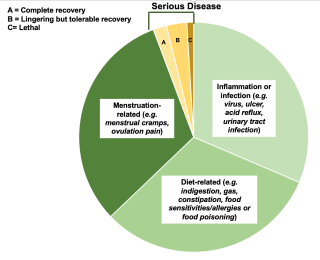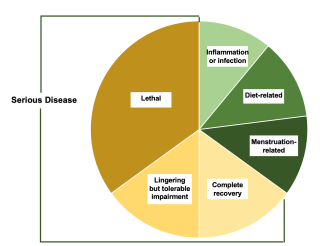Anxiety
The Pie Chart Method for Health Anxiety
If you tend to inflate the probability of serious disease, try this technique.
Posted August 29, 2023 Reviewed by Ray Parker
Key points
- When we have health anxiety, we tend to inflate the probability of serious disease, statistically speaking.
- CBT techniques can help you to see the likelihood of disease more accurately.
- The Pie Chart Method is one technique to help you consider the many non-catastrophic causes of symptoms.

When we have health anxiety, we tend to assume that many or all symptoms are indicative of serious illness. We do this because we overestimate the likelihood of serious disease.
Inflating the numbers like this can actually make you miserable. This is because when you believe serious disease is more common than it is, statistically speaking, then every bodily sensation and symptom becomes a health crisis.
One technique to help you refrain from inflating the numbers is the Pie Chart Method. For example, let’s say you have a stomach ache. You go to the doctor and, despite the doctor’s belief that it is likely due to a virus, indigestion, or something else benign, you worry that it might be something much more serious, such as some type of cancer.
First, we would assign a small percentage to the serious disease category because we know that is much less likely than the non-catastrophic categories. We then split up the serious disease category into subcategories: complete recovery, lingering but tolerable recovery, and lethal. For the rest of the pie chart, we would then want to come up with several potential non-catastrophic explanations because these explanations are much more likely, statistically speaking.
Now, looking at this chart, you can see that just a tiny sliver of the serious disease category is the actual catastrophic outcome, which is the lethal subcategory. Even the other subcategories within the serious disease category (i.e., complete recovery and lingering but tolerable recovery) are not catastrophic because you would overcome those illnesses.
The main takeaway of this exercise is this: We typically overestimate how much of the pie represents the catastrophic outcome. Instead of it being just a tiny sliver like it is in the pie chart above, in our mind, it often looks more like the pie chart below.

See the difference? The real question is: Who on planet Earth wouldn’t be anxious about a symptom if they genuinely believed the chances of serious disease were this high?
The Pie Chart Method can be helpful in a couple of ways:
- It can help you to consider the wide range of alternative and non-catastrophic explanations.
- It can also help you to more realistically estimate the likelihood of catastrophic outcomes, which is much lower than you are assuming it is.
I encourage you to try this technique out the next time you feel anxious about a symptom. I’ve included a few tips when completing your own pie chart.
Tips for completing the Pie Chart Method
- Start with the serious disease category and make a few slivers of serious disease subcategories as you see in the pie chart above.
Note: Please do not bother listing out all of the different serious diseases because I don’t want you going down a rabbit hole for outcomes that are much less likely. This would end up being counterproductive.
2. Next, move to the non-catastrophic causes. This will take more time since these possible outcomes are more likely and, thus, will consume a much bigger chunk of the pie. Try to come up with as many non-catastrophic causes as you can.
Note: If you need help coming up with possible explanations, you could try a few options. First, you could consult with someone you know who has medical knowledge and may be able to quickly offer some benign, non-catastrophic explanations. Another option is to google non-serious causes of the symptom just to get some ideas from reputable websites. If you do this, however, I recommend you proceed with caution. If you think it will be too tempting to go to the dark side and browse through serious causes, then I recommend having a loved one do this task for you.
This is just one of the many types of cognitive behavioral therapy (CBT) techniques available to help you see the probability of serious disease more accurately. Good luck with this task.


